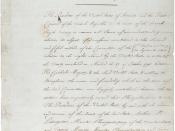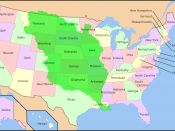Expansion and Unity
During the 1800s the United States was rapidly growing. Despite the growing need for expansion, there was still opposition to the acquisition of new land. At first constitutionally during the Louisiana Purchase, and then later over the issue of slavery in the 1850s. The issue of territorial expansion brought about heated tension between party lines and regional lines during the early to mid 1800s.
When Thomas Jefferson wanted to acquire the Louisiana Purchase, the Federalist Party met him with opposition. The opposition, however, was on a national basis. The heated debates were about issues that effected the entire nation, and were decided along party lines, instead of sectional lines. However, this purchase more than doubled the United States and set up the question of slavery which would rise again with every expansion of the United States. While the purchase was along party lines, the expansion of slavery was deeply routed along sectional lines.
The question over the expansion of slavery brought about heated debates in congress until finally a solution was reached in the Missouri Compromise.
In the next major acquisition of land under President Polk, the issue of slavery in the territories was once again brought up before congress. Because the lands were outside of the Louisiana Purchase, the one compromise that had been the most successful in keeping the peace was not in effect in the lands of the Mexican Secession. More heated debates in congress ensued, this time splitting the country along sectional lines completely. Talks of secession and violence in Kansas threatened the integrity of the Union. This time, however, there was no magic compromise that would keep the Union at peace for at least some time. Before the issue could be resolved, civil war broke out. With these...


